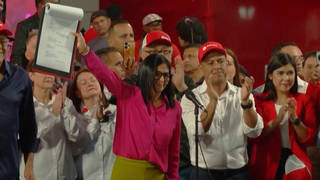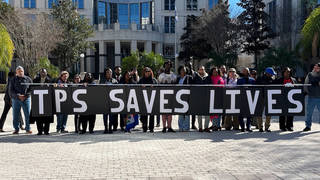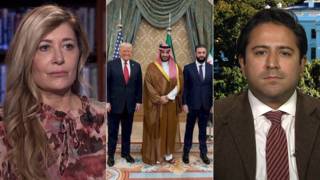
“How much is Trump pocketing off the presidency?” That’s the question driving a major new investigation by journalist David D. Kirkpatrick in The New Yorker, which finds that the first family has been leveraging its place atop U.S. politics to rake in billions. According to Kirkpatrick, Donald Trump and his immediate family have made $3.4 billion from his time in the White House, including more than $2.3 billion from various cryptocurrency ventures alone.
“What really surprised me about all this is just how fast they’re making this money. They seem to turn down no opportunity,” says Kirkpatrick. “It really sharpens the question of what a buyer, so to speak, might be getting for that.”
Transcript
AMY GOODMAN: This is Democracy Now!, democracynow.org, The War and Peace Report. I’m Amy Goodman, with Juan González.
“The Number: How Much Is Trump Pocketing Off the Presidency?” That’s the headline of an exhaustive new investigation published by The New Yorker magazine. In the piece, journalist David Kirkpatrick writes, quote, “Many payments now flowing to Trump, his wife, and his children and their spouses would be unimaginable without his Presidencies: a two-billion-dollar investment from a fund controlled by the Saudi crown prince; a luxury jet from the Emir of Qatar; profits from at least five different ventures peddling crypto; fees from an exclusive club stocked with Cabinet officials and named Executive Branch.”
In March, Forbes estimated that Trump’s net worth had more than doubled over a year to $5 billion. And a few months later, The New York Times estimated Trump’s wealth had grown to $10 billion. But these estimates and others did not attempt to look at how exactly his fortune is growing.
David Kirkpatrick writes, quote, “Although the notion that Trump is making colossal sums off the Presidency has become commonplace, nobody could tell me how much he’s made. … I decided to attempt to tally up just how much Trump and his immediate family have pocketed off his time in the White House,” unquote.
Well, David Kirkpatrick joins us now in our New York studio.
Welcome to Democracy Now! It’s great to have you with us. Explain how you arrived at the number. And what are the — is the period of time that he has made this money?
DAVID KIRKPATRICK: Well, what’s important here is that I’m trying to be fair to the president. I’m not out to get Trump here. I went through and looked at all the sources of income, the income streams flowing into the Trump Organization, the president and his family, and I asked: Is this money that he would have made absent the presidency? Because he’s got hotels, he’s got golf courses. Sometimes people go there just to play golf or rent a hotel room. We’re not talking about that. So, I only wanted to look at money that he has made because he is or has been in the White House. And then I tried to ask, as best I could: What is each one of those things worth? And that’s how I came up with $3.4 billion. And again, I think what I hope will make this report credible, and the reason I urge people to read it, is that it’s — I’ve tried as best I can to be fair. I’ve shown all my work. And people can make their own conclusions.
JUAN GONZÁLEZ: And, David, could you talk about some of the specifics, from the small to the big, for instance, the ubiquitous MAGA hat at Trump rallies? How is — Trump has a private store that sells these? Can you talk about that, and also the family’s investments in crypto?
DAVID KIRKPATRICK: Yeah, the hats. I was quite surprised to realize that in addition to the campaign merchandise sold by his campaign, which all candidates and all presidents do — that’s money that goes into the campaign coffers, that he can’t really touch for personal purposes — the Trump Organization also has its own online store, and they sell all kinds of Trump merchandise that looks very much like its campaign merchandise, but this money flows to Trump and himself — you know, $20, $40 for a pair of flip-flops, a pair of beer koozies, a baseball hat. He’s making, you know, millions of dollars — you know, I forget what the exact number was, but 20 millions of dollars over the last few years — selling this kind of merchandise, which is arguably competing with his own campaign and diverting some of the money that his supporters might think is supporting the MAGA movement and his candidates to his own pocket. That’s the — you know, that’s the small end. Nobody thinks that anybody who’s paying $50 for a baseball hat is actually going to get any influence, you know, over the president in return for that. That’s just a way of making money.
On the other extreme, there’s significant amounts of money flowing into the Trump Organization now through its various or the president’s various crypto enterprises. Some of these, you know, predate his return to the White House, but I tried to look here at the — you know, all the money that they made off of the White House over the course of the two terms and the time in between, when he remained a kind of kingmaker in the Republican Party, so — and most of it has happened during around his second term, you know, shortly before, through his second term. In terms of crypto, you know, should I go through and break down all the ways they’re making money off of crypto?
AMY GOODMAN: Yes.
DAVID KIRKPATRICK: OK, well, here you go. So, first of all, for people who might not be familiar with crypto, all it is, really, is a kind of online ledger or spreadsheet keeping track of who owns what. There’s a number of ways the Trump family has tried to take advantage of this new technology. He started out by selling NFTs, non-fungible tokens, which are basically sort of digital cartoons of himself.
Then he moved on to setting up a company. His family, his sons set up a company called World Liberty Financial. And that’s done a couple things. It sold a kind of token or online certificate that would ostensibly allow somebody to vote on whatever its futures, plans in the crypto business might be. They raised, you know, $550 million selling those tokens, and 75% of that flows to the Trump Organization. Then it went into a new business, selling what’s known as a stablecoin. A stablecoin is basically the online equivalent of a dollar. It’s not really an investment. It’s just a kind of, like, almost a checking account. It’s a way to transfer money here and there, perhaps more efficiently by doing it digitally. For the company, World Liberty Financial, they get to make money off of investing that money in treasuries while it’s out in the world circulating as a stablecoin. So, they go into the stablecoin business. Their first customer is a company owned by the United Arab Emirates that puts up $2 billion to buy stablecoin. While that money is out circulating as stablecoin, they’re going to get about 4% a year on that, I calculate, by investing it in short-term treasuries. So, that’s a couple.
There’s a few others he’s gone into. His memecoin is perhaps the most famous. President Trump, right around the time he was elected, before he was inaugurated, went into this business selling a kind of online novelty, basically just a joke. It’s a kind of digital certificate that just allows you to say, “I paid money to own a little Trump novelty.” That’s it. That’s all it is. There’s nothing to it. And it doesn’t even purport to sort of hold wealth, although you can trade it back and forth. He’s made about $300 million selling those memecoins.
And the last thing is a little bit of kind of a financial engineering that his company, Trump Media & Technology Group, a publicly traded company of which he’s the chairman — a little bit of financial engineering that that company has done. Now, that is the company that owns Truth Social. Truth Social is a very small online platform, social media platform. It doesn’t have much revenue, maybe a million dollars a quarter. It’s never really made a profit. It doesn’t have much chance of ever making a profit. And yet, the stock that owns it, Trump Media & Technology Group, trades at a kind of surprisingly high price. People on Wall Street consider it a meme stock. It trades basically on how people feel about President Trump. And in the last couple months, really in June, that company has done a remarkable thing, which is they have sold — they’ve issued new shares of stock. They’ve sold the stock at their inflated memecoin price, and they’ve taken that money, and they’ve bought bitcoin. They’ve also done the same thing to try to stockpile some cash, but they’ve bought about $2.3 or $2.4 billion worth of bitcoin, and they’ve stockpiled about $760 million worth of cash. So, in the end of last quarter, they said, “Look, we’ve got $3.1 billion of liquid assets on our books.” So, I calculate that since President Trump owns 42% of that company, he has an ownership interest in that $3.1 billion. So, as I was doing this reporting over the last few months there, my calculation of their net worth, of his net worth, bumped by — I shouldn’t say “his net worth” — of the amount of money he’s made off the presidency, jumped up by a billion dollars.
JUAN GONZÁLEZ: Yeah, other members of the family, for instance, Jared Kushner and his daughter, in terms of the investments by foreign government sovereign funds in them, and what that looks like?
DAVID KIRKPATRICK: I think you’re thinking about Jared Kushner’s private equity firm.
JUAN GONZÁLEZ: Yes.
DAVID KIRKPATRICK: So, after he left — after Trump left the White House in 2020, his son, Jared Kushner, who had been in real estate, went into private equity, a new line of work. And he went to the Persian Gulf to solicit money, and he asked the sovereign wealth fund of the United — of Saudi Arabia to invest. Their panel of advisers said, “This is a mistake. He doesn’t have a track record in private equity, only real estate. There could be some public relations problem here. People are going to say this is a payoff to the family of a president.” The crown prince of Saudi Arabia, who controls the public investment fund, overruled that and, nonetheless, invested the $2 billion with Jared Kushner’s private equity firm.
Since then, he’s accumulated as much as $4.8 billion in assets under management, almost all of it from foreign sources, quite a bit of it also from the United Arab Emirates and Qatar. Under standard private equity terms, he would get 2% a year of that money as asset management fees. With Saudi Arabia, it’s a little bit lower. But that is also, I’m counting as, money flowing into the Trump family coffers as a result of their time in the White House.
AMY GOODMAN: Can you tell us, David, about the family? I mean, in the first term, many of them were advisers to President Trump. They were in the White House. They would have to deal with ethics rules. We don’t see that right now. So, I’m wondering how the family business has changed from the first term to the second term. And I also wanted to ask you about — for example, President Trump says he struck a trade agreement with Vietnam. He’ll apply a 20% tariff on Vietnamese imports, down from the 46% he threatened. The reported deal comes just weeks after the Trump Organization broke ground on a $1.5 billion golf course in Vietnam. A few questions there.
DAVID KIRKPATRICK: Yeah, a few questions there. So, during the first term, President Trump, on his way into office, volunteered that he and his family were not going to do any deals overseas, because they didn’t like the way that looked. Right? It raises the specter that some foreign interest, or even foreign government, is going to try to buy favor with the U.S. government by paying Trump and his family privately.
During the second term, the family has said, “We’re not going to do that anymore. We’re no longer going to abstain from those deals.” Donald Trump Jr. has said publicly, “Look, we restrained ourselves last term, and people accused us of profiteering anyway. So we’re not going to lock ourselves in, quote-unquote, 'the proverbial padded room.' We’re just going to go ahead and be businessmen and do as many deals as we can.” And they’ve done quite a few.
Now, again, in my accounting, I’m not including deals which appear to be extensions of the business they were in before he was elected. You know, he had licensed his name for use on four condominium buildings around India before he ever went into the White House. Now there are five more Indian projects. Fine, let’s leave that aside. That’s, more or less, legitimate Trump business.
On the other hand, since late 2022, when he was really the presumptive Republican presidential nominee, he’s had a whole flurry of new deals around the Persian Gulf with one Saudi Arabian company, and that’s in, you know, Oman, the United Arab Emirates, a couple in Saudi Arabia and one in Qatar. And I don’t think there’s any way those would have happened without the presidency. And that adds up to, I would say, you know, guessing as best I can the various income streams involved — that’s more than $100 million right there in terms of its present value.
You mentioned the Vietnam project. That’s another one that I think, you know, would not have unfolded as it has, were he not returning to the White House. That is probably, you know, physically, going to be the largest Trump-branded property in the world. Its planned size is about three times as big as Central Park with 54 holes of golf. It’s very hard to know how much the Trump family is actually going to make out of that property. On his most recent financial disclosure form, he said that the Trump Organization had already received $5 million in initial licensing fees from lending their name to that property. He’s not going to build it. He’s not going to own it. They’re just lending their name and some management services. So, I figure, over 10 years, which is kind of a minimum term for a management or licensing agreement, he’s likely to make at least $50 million, with a present value of about $40 million. Probably it’ll be a lot more than that.
JUAN GONZÁLEZ: And how much of this, in your perspective, is legal or — and also, how much of it is unprecedented for a president?
DAVID KIRKPATRICK: As far as I can tell, it’s all legal. You know, I don’t have any evidence of a quid pro quo. I don’t have any evidence of a specific instance where he has explicitly sold a public favor for personal profit. And the remedy that our laws prescribe for potential conflicts of interest is disclosure. Elected officials disclose what they own and how they’re making money, and the voters or the Congress can decide what’s appropriate or inappropriate. And I guess we’ll have to see how voters feel about that. The other part of your question, I think, was — what again?
JUAN GONZÁLEZ: How much of this is unprecedented for a president?
DAVID KIRKPATRICK: Oh, yeah. Well, a lot of — that’s been widely reported. There’s nothing like this before, right? A lot of presidents make money after they leave, selling books, you know, various other endeavors. But he and his family are making this money while he’s in the White House. And the scale is really quite novel.
AMY GOODMAN: And in the last 10 seconds, you talk about the frenzy.
DAVID KIRKPATRICK: Well, that’s right. What really surprised me about all this is just how fast they’re making this money. They seem to turn down no opportunity. And that’s what makes the questions about a conflict of interest all the more pressing, because I feel like when they are so evidently zealous, so eager to make money, it really sharpens the question of what a buyer, so to speak, might be getting for that.
AMY GOODMAN: David Kirkpatrick, we want to thank you so much for being with us, reporter with The New Yorker. We’ll link to your piece, “The Number: How Much Is Trump Pocketing Off the Presidency?”
Coming up, immigrant detainees held at the so-called Alligator Alcatraz in Florida are stuck in a legal black hole. So says the ACLU, which has taken the Trump administration to court. Back in 20 seconds.
[break]
AMY GOODMAN: “Rican Beach” by Alynda Segarra of Hurray for the Riff Raff, performing in our Democracy Now! studio.













Media Options